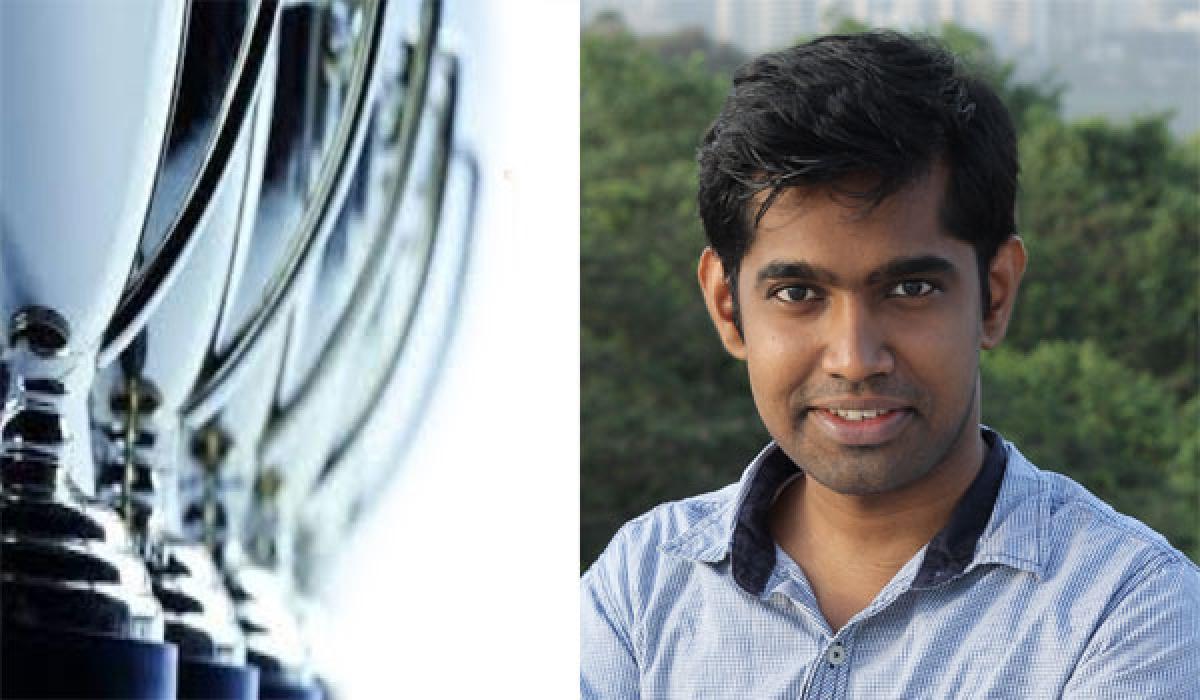Live
- HMPV Outbreaks Spark Global Health Concerns: What You Need to Know
- Gautam Gambhir Faces Criticism Over Tactical Errors in Australia Tour
- CM Revanth Reddy Announces Surprise District Tours Starting January 26
- Telangana's TOMCOM Invites Applications for Driver Jobs in Germany
- Calcutta HC rejects plea by rights body for stall allotment at Kolkata Book Fair
- Bengaluru Beer Prices to Rise by Up to 20% Starting January 20
- My Fans Are Like Disciplined Soldiers: Nandamuri Balakrishna
- Adani Group raises Rs 4,850 crore after selling 13.5 pc stake in Adani Wilmar
- "Jogulamba Gadwal Health Officials Assure Public: No Panic Over HMPV Virus".
- "Charity and Annadanam Program Held on BOSS Hanumanthu Naidu’s Birthday".
Just In

Aravind Kumar Rengan, Assistant Professor, Department of Biomedical Engineering, Indian Institute of Technology – Hyderabad has been awarded the prestigious Indian National Science Academy (INSA) medal in the Young Scientist category for 2017.He is being recognised for having devised a novel way of nano delivery using liposomes and gold nano particles. This is useful for both imaging and therapeut
Aravind Kumar Rengan, Assistant Professor, Department of Biomedical Engineering, Indian Institute of Technology – Hyderabad has been awarded the prestigious Indian National Science Academy (INSA) medal in the Young Scientist category for 2017.He is being recognised for having devised a novel way of nano delivery using liposomes and gold nano particles. This is useful for both imaging and therapeutics.
Since 1974, INSA annually presents the Young Scientist Award to distinguish young scientists who have made notable research contributions in science and technology. The INSA Young Scientist Medal award carries a bronze medal and a cash prize of Rs 25,000. There are some other incentives attached with this award as well. The INSA Young Scientists Award is considered to be the highest recognition of promise, creativity and excellence in a young scientist.
This research, through which he was able to engineer a biodegradable nano-system for photothermal therapy of cancer and proved its in-vivo biodegradability, has got immense translational potential and can be used to treat cancer in an affordable way with minimal side effects.
His research work was published in the journal of NANOSCALE (Impact factor 7.76) and ACS NANO LETTERS (Impact Factor: 13.78) both being prestigious journals in nanotechnology. Dr Aravind’s entire bio-engineering research work was carried out in India, bringing credits to our country in the International arena.
Prof Aravind Kumar studied M B B S and his keen interest in Biomedical Engineering and Nano research pushed him to take up M Tech at Amrita Centre for Nano sciences and Molecular medicine - DST Centre of Excellence. He secured university rank and was selected for his PhD in Biomedical Engineering at IIT Bombay under the guidance of Prof Rohit Srivastava co-guided by Prof Rinti Banerjee at the Dept of Bioscience and Bioengineering, in collaboration with Dr Abhijit De, ACTREC – Tata Cancer Centre.
Prof Aravind is also the recipient of Innovative Young Biotechnologist Award, DST - INSPIRE Faculty Award, IIT Bombay Institute Excellence Award in PhD Thesis (2014-16), and has been awarded twice as Gandhian Young Technological Innovator (2015- as student IIT Bombay & 2017- as guide IIT Hyderabad).
The INSA award will be presented to Professor Aravind by the INSA President during the Anniversary General Meeting in December 2017. Also, Prof Aravind will be eligible for being considered for a visit abroad with full support, for presenting research work at conferences, and/or participating in collaborative / training research projects, start-up research support, wherever possible.
Speaking about the INSA award, Prof U B Desai, Director, IIT Hyderabad says, “We are delighted that Dr Rengan has made a mark in scientific work related to curing cancer and has brought pride to IIT Hyderabad. It is work like this by our young faculty that will bring international recognition to IIT Hyderabad.”
Speaking about achieving the prestigious INSA Award, Dr Aravind says “When I switched my career trajectory from clinical medicine to Nanomedicine (research), little did I know that it’s going to be highly rewarding. This Award is an encouragement for the good scientific work that we do in India, which is comparable to international standards. I would be very happy if many more young medicos take up research as their mainstream career, which will benefit our country in the long run. I dedicate this prestigious award to my teachers, my UG & PG institutes and my supportive family (which includes IIT Hyderabad)”.
By Bhagyashree Kottoori

© 2025 Hyderabad Media House Limited/The Hans India. All rights reserved. Powered by hocalwire.com







